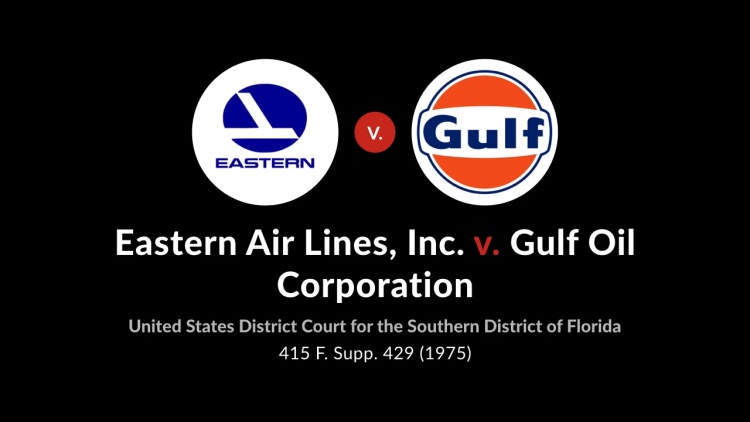Eastern Air Lines, Inc. v. Gulf Oil Corp.
United States District Court for the Southern District of Florida
415 F. Supp. 429 (1975)

- Written by Christine Hilgeman, JD
Facts
Gulf Oil Corp. (Gulf) (defendant) executed a contract with Eastern Airlines (Eastern) (plaintiff) under which it was to provide jet fuel to Eastern. The agreement was drafted by Gulf but negotiated extensively by both parties to reflect their long-standing business relationship. The contract provided that Eastern would purchase from Gulf any jet fuel it needed in certain cities. In turn, Gulf would make the necessary arrangements to satisfy Eastern’s reasonable, good-faith jet-fuel needs in those cities. The contract also provided that payment would be calculated according to a price-escalation provision tied to postings in Platt’s Oilgram Crude Oil Supplement. During the period of energy crises in 1973 and 1974, Gulf repudiated its contract with Eastern. In defending against an action for breach of contract, Gulf alleged that the contract was not binding because it lacked mutuality of obligation and that Eastern had breached the contract by changing its fuel requirements from city to city depending on the price of fuel, a practice known in the airline industry as fuel freighting. Gulf also alleged that its performance under the contract had become commercially impracticable for two reasons: (1) the price-escalation provision that tied payment to Platt’s no longer represented the intent of the parties because of a two-tier pricing model imposed by the government, and (2) the worldwide oil shortage caused substantial increases in crude oil prices, and there was no corresponding increase in the escalation clause. The record at trial, however, showed that Gulf’s profits went up proportionally to the cost of foreign oil in the 1973–1974 period, and in fact, Gulf’s 1974 profits exceeded its 1973 profits. Nor did Gulf’s evidence of increased costs demonstrate hardship, because the costs it proved were related to transfer pricing—the costs associated with intracompany costs of moving goods from one segment of the corporation to another. The record also showed that Gulf executives were in close contact with government policymakers prior to the imposition of the new pricing policies.
Rule of Law
Issue
Holding and Reasoning (King, J.)
What to do next…
Here's why 910,000 law students have relied on our case briefs:
- Written by law professors and practitioners, not other law students. 47,100 briefs, keyed to 997 casebooks. Top-notch customer support.
- The right amount of information, includes the facts, issues, rule of law, holding and reasoning, and any concurrences and dissents.
- Access in your classes, works on your mobile and tablet. Massive library of related video lessons and high quality multiple-choice questions.
- Easy to use, uniform format for every case brief. Written in plain English, not in legalese. Our briefs summarize and simplify; they don’t just repeat the court’s language.





